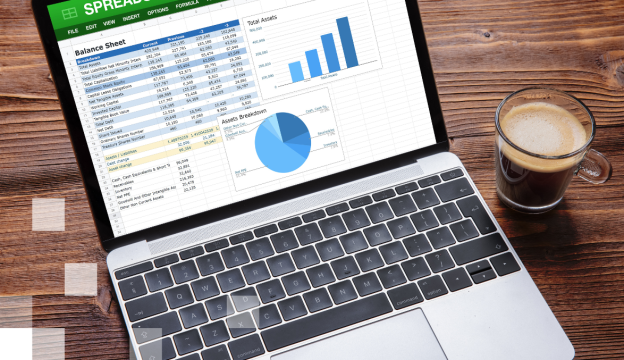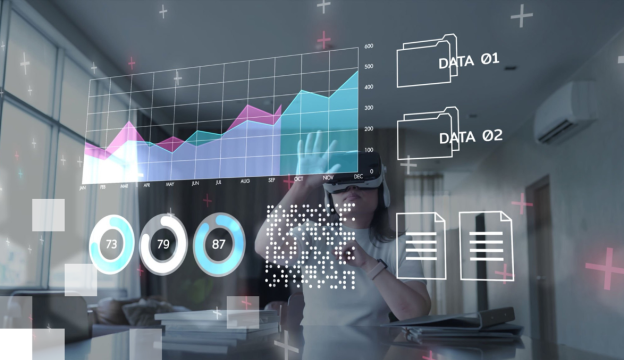Microsoft Power BI Data Analyst
This 3 day training will provide an opportunity to learn the most popular methods for data modelling, visualization and analysis using Microsoft Power BI. Participants will learn how to access data, process it properly using both relational and non-relational sources, create interactive and automated reports, share and manage it.
The course, its program, and materials have been developed by BDA.
EU co-financing of 50-70% is available to companies.
The total cost of tuition may vary depending on the rules of the specific association.
Plans
Contact us
Apply or ask a question!
If you want to apply for the course or ask a question about it, feel free to use this form. |
||||||||||||||
|
||||||||||||||
Course target
This course is designed to provide an overview of the Microsoft Power Platform and its capabilities for creating low-code/no-code business applications. The course covers topics such as data modeling, app design, and workflow automation using Power Apps, Power Automate, and Power BI.
The objective of the course is to enable participants to create custom business applications with the Power Platform, and to understand how these applications can be used to solve real-world business problems.
Upon completion of the course, participants will be equipped with the skills and knowledge needed to become a certified Power Platform functional consultant.
Audience
Data and business intelligence professionals who wants to learn how to accurately perform data analysis by using Power BI. This course is also targeted toward those individuals who develop reports that visualize data from the data platform technologies that exist on both in the cloud and on-premises.
At Course Completion you will be able to:
- ingest, clean, and transform data;
- model data for performance and scalability;
- design and create reports for data analysis;
- apply and perform advanced report analytics;
- manage and share report assets;
- create paginated reports in Power BI.
Prerequisites
Successful Data Analysts start this role with experience of working with data in the cloud.
Specifically:
- understanding core data concepts;
- knowledge of working with relational data in the cloud;
- knowledge of working with non-relational data in the cloud;
- knowledge of data analysis and visualization concepts.
You can gain the prerequisites and a better understanding of working with data in Azure by completing Microsoft Azure Data Fundamentals before taking this course.
Training materials
Microsoft Learn environment.
Certification Exam
PL-300: Microsoft Power BI Data Analyst (the exam fee is already included in the course price).
Course outline
1. Get Started with Microsoft Data Analytics
This module explores the different roles in the data space, outlines the important roles and responsibilities of a Data Analysts, and then explores the landscape of the Power BI portfolio.
- Data Analytics and Microsoft;
- Getting Started with Power BI.
Lab: Getting Started in Power BI Desktop:
- Getting Started.
2. Prepare Data in Power BI
This module explores identifying and retrieving data from various data sources. You will also learn the options for connectivity and data storage and understand the difference and performance implications of connecting directly to data vs. importing it.
- Get data from various data sources.
Lab: Preparing Data in Power BI Desktop:
- Prepare Data.
3. Clean, Transform, and Load Data in Power BI
This module teaches you the process of profiling and understanding the condition of the data. They will learn how to identify anomalies, look at the size and shape of their data, and perform the proper data cleaning and transforming steps to prepare the data for loading into the model.
- Data shaping;
- Enhance the data structure;
- Data Profiling.
Lab: Transforming and Loading Data in Power BI Desktop:
- Loading Data.
4. Design a Data Model in Power BI
This module teaches the fundamental concepts of designing and developing a data model for proper performance and scalability. This module will also help you understand and tackle many of the common data modeling issues, including relationships, security, and performance.
- Introduction to data modeling;
- Working with tables;
- Dimensions and Hierarchies.
Lab: Data Modeling in Power BI Desktop:
- Create Model Relationships;
- Configure Tables;
- Review the model interface;
- Create Quick Measures.
Lab: Advanced Data Modeling in Power BI Desktop
- Configure many-to-many relationships;
- Enforce row-level security.
5. Create Model Calculations using DAX in Power BI
This module introduces you to the world of DAX and its true power for enhancing a model. You will learn about aggregations and the concepts of Measures, calculated columns and tables, and Time Intelligence functions to solve calculation and data analysis problems.
- Introduction to DAX;
- DAX context;
- Advanced DAX.
Lab: Advanced DAX in Power BI Desktop:
- Use the CALCULATE() function to manipulate filter context;
- Use Time Intelligence functions.
Lab: Introduction to DAX in Power BI Desktop
- Create calculated tables;
- Create calculated columns;
- Create measures.
6. Optimize Model Performance in Power BI
In this module you are introduced to steps, processes, concepts, and data modeling best practices necessary to optimize a data model for enterprise-level performance.
- Optimze the model for performance;
- Optimize DirectQuery Models;
- Create and manage Aggregations.
7. Create Reports in Power BI
This module introduces you to the fundamental concepts and principles of designing and building a report, including selecting the correct visuals, designing a page layout, and applying basic but critical functionality. The important topic of designing for accessibility is also covered.
- Design a report;
- Enhance the report.
Lab: Designing a report in Power BI Desktop
- Create a live connection in Power BI Desktop;
- Design a report;
- Configure visual fields and format properties.
Lab: Enhancing reports with interaction and formatting in Power BI Desktop
- Create and configure Sync Slicers;
- Create a drill through page;
- Apply conditional formatting;
- Create and use Bookmarks.
8. Create Dashboards in Power BI
In this module you will learn how to tell a compelling story through the use of dashboards and the different navigation tools available to provide navigation. You will be introduced to features and functionality and how to enhance dashboards for usability and insights.
- Create a Dashboard;
- Real-time Dashboards;
- Enhance a Dashboard.
Lab: Creating a Dashboard in Power BI Service:
- Create a Dashboard;
- Pin visuals to a Dashboard;
- Configure a Dashboard tile alert;
- Use Q&A to create a dashboard tile.
9. Enhance reports for usability and storytelling in Power BI
This module will teach you about paginated reports, including what they are how they fit into Power BI. You will then learn how to build and publish a report.
- Paginated report overview;
- Create Paginated reports.
Lab: Creating a Paginated report in Power BI Desktop:
- Use Power BI Report Builder;
- Design a multi-page report layout;
- Define a data source;
- Define a dataset;
- Create a report parameter;
- Export a report to PDF.
10. Perform Advanced Analytics in Power BI
This module helps you apply additional features to enhance the report for analytical insights in the data, equipping you with the steps to use the report for actual data analysis. You will also perform advanced analytics using AI visuals on the report for even deeper and meaningful data insights.
- Advanced Analytics;
- Data Insights through AI visuals.
Lab: Data Analysis in Power BI Desktop:
- Create animated scatter charts;
- Use the visual to forecast values;
- Work with Decomposition Tree visual;
- Work with the Key Influencers visual.
11. Manage Datasets in Power BI
In this module you will learn the concepts of managing Power BI assets, including datasets and workspaces. You will also publish datasets to the Power BI service, then refresh and secure them.
- Parameters;
- Datasets;
- Security in Power BI.
12. Create and Manage Workspaces in Power BI
This module will introduce you to Workspaces, including how to create and manage them. You will also learn how to share content, including reports and dashboards, and then learn how to distribute an App.
- Creating Workspaces;
- Sharing and Managing Assets.
Lab: Publishing and Sharing Power BI Content:
- Map security principals to dataset roles;
- Share a dashboard;
- Publish an App.
If you want to get more information about this course, please contact us by phone +371 67505091 or send an e-mail at mrn@bda.lv.












